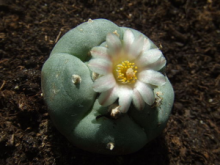Article
Peyote is a small, spineless cactus found in Mexico and Texas. When ingested, the plant has psychedelic qualities and causes hallucination, trances, and visions for its users. Peyote has been used by indigenous groups in the Americas for ceremonial purposes for thousands of years.
Peyote became the main sacrament of the Native American Church, formed in 1918 as a Pan-Indian organization. After the relocation and abuses of the US government, the church, a synthesis of traditional and Christian observances, found a captive audience. The Native American Church celebrates the use of peyote, classified as a controlled substance by the U.S. government, and its effects as a religious experience protected by the First Amendment to the U.S. Constitution.
"Peyote button in flower, April 21, 2007" by Hans B. is licensed under CC BY-SA.
Manuscripts
A06 People of Darkness (03-06) p. 27
A06 People of Darkness (03-06) p. 28
A06 People of Darkness (03-06) p. 46
A06 People of Darkness (03-06) p. 47
A06 People of Darkness (03-06) p. 51
A06 People of Darkness (03-06) p. 58
A06 People of Darkness (03-06) p. 59
A06 People of Darkness (03-06) p. 60
A06 People of Darkness (03-06) p. 72
A06 People of Darkness (03-06) p. 112
A06 People of Darkness (03-06) p. 141
A06 People of Darkness (03-06) p. 144
A06 People of Darkness (03-06) p. 145
A06 People of Darkness (03-06) p. 185
A06 People of Darkness (03-06) p. 218
A06 People of Darkness (03-06) p. 231
A06 People of Darkness (03-06) p. 233
References
Aberle, David Friend, Harvey C. Moore, and Denis F. Johnston
1966 Peyote Religion among the Navaho. Chicago: Aldine Pub. Co.
Gelo, Daniel J.
2006 Comanche Belief and Ritual. Ann Arbor: University Microfilms International.
Hill, Thomas W.
1990 Peyotism and the Control of Heavy Drinking: The Nebraska Winnebago in the Early
1900s. Human Organization: Journal Of The Society For Applied Anthropology 49 (3).
Paper, Jordan
2014 Native American Church. The American Mosaic: The American Indian Experience.
http://americanindian2.abc-clio.com/Search/Display/1482221?terms=native…, accessed
June 27, 2014.

